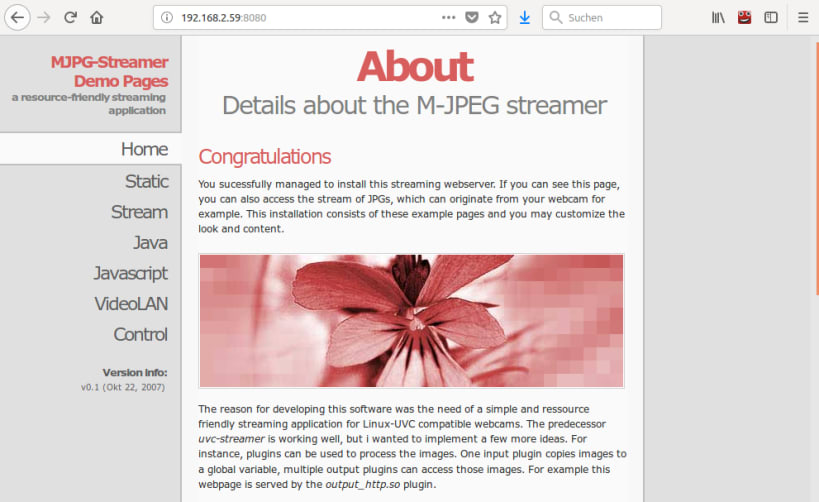


MJPG-streamer takes JPGs from Linux-UVC compatible webcams, filesystem or other input plugins and streams them as M-JPEG via HTTP to webbrowsers, VLC and other software. It is the successor of uvc-streamer, a Linux-UVC streaming application with Pan/Tilt.
This snap ships the input_uvc, input_file, input_http and input_ptp2 as well as the output_file, output_http, output_rtsp, output_udp and output_viewer plugins by default, opencv is currently not supported.
Additionally to the mjpg-streamer command the snap ships a service that can be configured via the /var/snap/mjpg-streamer/current/config file. Set the DAEMON= option in there to "true", then run "snap restart mjpg-streamer" (or reboot the system) to get the mjpg-streamer service up and running.
Please make sure to run "snap connect mjpg-streamer:camera" to allow the app to access /dev/video*.
The source code for this snap can be found at https://github.com/ogra1/mjpg-streamer
You are about to open
Do you wish to proceed?
Thank you for your report. Information you provided will help us investigate further.
There was an error while sending your report. Please try again later.
Snaps are applications packaged with all their dependencies to run on all popular Linux distributions from a single build. They update automatically and roll back gracefully.
Snaps are discoverable and installable from the Snap Store, an app store with an audience of millions.

Snap is available for Red Hat Enterprise Linux (RHEL) 8 and RHEL 7, from the 7.6 release onward.
The packages for RHEL 7, RHEL 8, and RHEL 9 are in each distribution’s respective Extra Packages for Enterprise Linux (EPEL) repository. The instructions for adding this repository diverge slightly between RHEL 7, RHEL 8 and RHEL 9, which is why they’re listed separately below.
The EPEL repository can be added to RHEL 9 with the following command:
sudo dnf install https://dl.fedoraproject.org/pub/epel/epel-release-latest-9.noarch.rpm
sudo dnf upgrade
The EPEL repository can be added to RHEL 8 with the following command:
sudo dnf install https://dl.fedoraproject.org/pub/epel/epel-release-latest-8.noarch.rpm
sudo dnf upgrade
The EPEL repository can be added to RHEL 7 with the following command:
sudo rpm -ivh https://dl.fedoraproject.org/pub/epel/epel-release-latest-7.noarch.rpm
Adding the optional and extras repositories is also recommended:
sudo subscription-manager repos --enable "rhel-*-optional-rpms" --enable "rhel-*-extras-rpms"
sudo yum update
Snap can now be installed as follows:
sudo yum install snapd
Once installed, the systemd unit that manages the main snap communication socket needs to be enabled:
sudo systemctl enable --now snapd.socket
To enable classic snap support, enter the following to create a symbolic link between /var/lib/snapd/snap and /snap:
sudo ln -s /var/lib/snapd/snap /snap
Either log out and back in again or restart your system to ensure snap’s paths are updated correctly.
To install mjpg-streamer, simply use the following command:
sudo snap install mjpg-streamer
Browse and find snaps from the convenience of your desktop using the snap store snap.

Interested to find out more about snaps? Want to publish your own application? Visit snapcraft.io now.